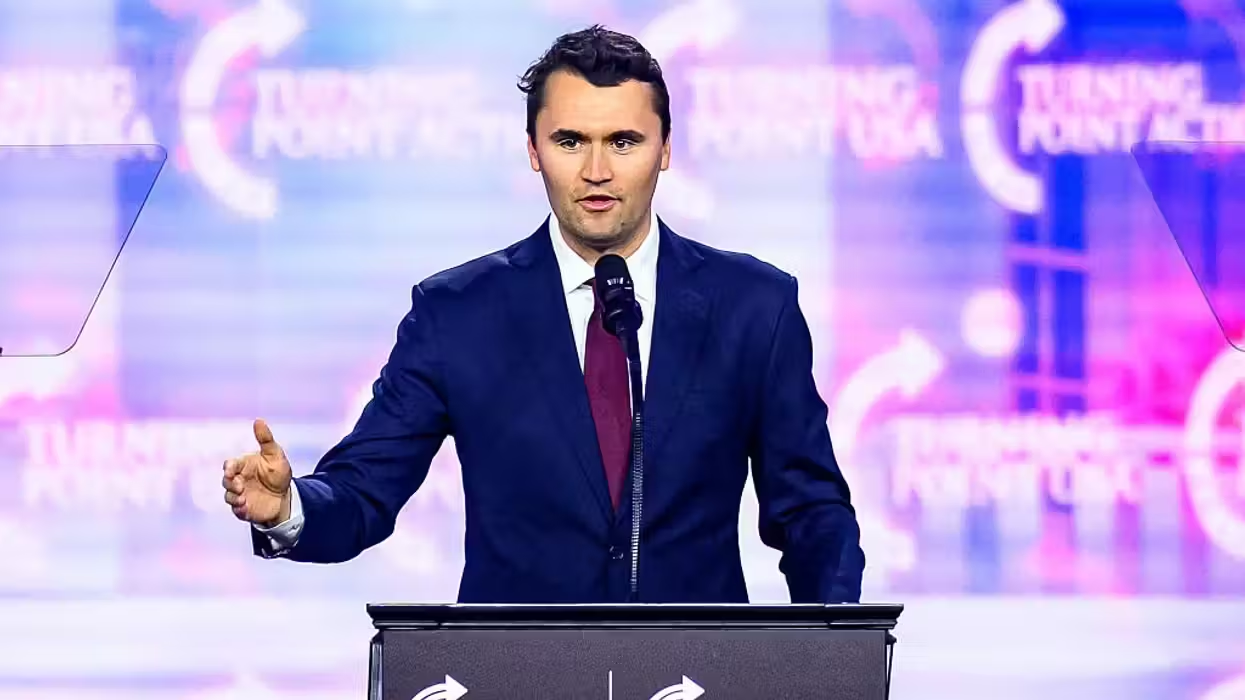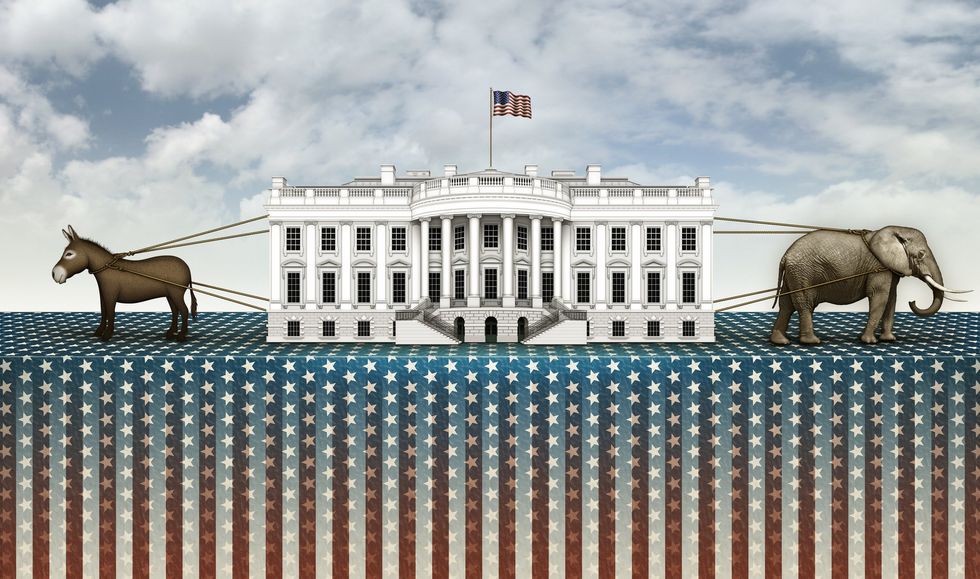
JOSH EDELSON/AFP via Getty Images
Which side are you on? Only two options are on the table.
Charlie Kirk’s memorial service was wasn’t just a remembrance — it was a revelation.
The memorial service was Christian nationalism in nascent, immature form. Not everyone who spoke was a Christian — and Christian nationalism does not require that. Yet what stood out most was that even people who do not share Charlie’s faith in Jesus showed open respect for the gospel. Everyone at the service was operating under the Christian gaze.
As the left grows more openly hostile to Christian belief, the right is becoming more consistently Christian.
The truth is this: We cannot make America great again without making America Christian again, which in turn means making America biblical again.
MAGA needs MACA and MABA.
For too long, Republicans spoke in vague religious clichés, paying lip service to an undefined faith in a nameless god. But Kirk’s memorial service was different. We saw speaker after speaker dare to define his faith in explicitly Christian terms.
This marks a seismic shift in a very short period of time. At the memorial, civil magistrates openly proclaimed the lordship of Christ as public truth. Media influencers called on us to repent of our particular sins particularly. A new widow forgave her husband’s alleged killer, in accord with Jesus’ teaching, and civil magistrates promised to use their power to terrorize evildoers, in accord with Romans 13.
As the left grows more openly hostile to Christian belief, the right is becoming more consistently Christian.
The lines are more clearly drawn than ever before. Both the service itself and the events of the last two weeks illustrate this reality.
Perhaps the most important part of the memorial was that Charlie Kirk’s legacy was accurately portrayed. Charlie consistently emphasized the cultural, political, and civilizational impact of Christian faith. Unlike many pastors, he was willing to connect the dots, linking his Christian beliefs to every sphere of life: economics, marriage and family, immigration and nationhood, limited government, and more.
For him, the Christian faith was not a private set of religious ideas but a comprehensive system of truth that works in the real world. He challenged people (especially college students) with a biblical worldview, demonstrating that Christian faith offers coherent and compelling answers to both the pressing personal and political questions of the day.
That conviction came through in the memorial service, and for that I am grateful.
It's now becoming painfully obvious that the “third-wayism” of so many “Big Eva” leaders has been exposed as untenable.
Third-wayism treats both sides of the political spectrum as morally equivalent, with each side getting some things right and other things wrong. Third-wayism advocates attempt to remain neutral, in order to avoid controversy and causing offense.
But in reality, there is no middle ground between progressive/secular and conservative/Christian political commitments. Those who want to avoid the culture war will still be drawn into it — just on the wrong side.
Third-wayists try to stay above the fray, but in doing so they actually compromise with evil. Because they insist on balancing left and right, if the left radicalizes and moves farther left, the third-wayist must also shift leftward in order to remain in the “middle.” In the process, third-way advocates end up justifying extreme progressive positions simply to maintain their supposed neutrality.
They are constantly chasing an Overton window that keeps moving leftward.
RELATED: How JD Vance exposed the convenient theology of progressive Christians

At its core, third-wayism attempts to treat progressivism as equally compatible with the Christian faith as conservatism. It's true that there exists a kind of Christ-less conservatism that reduces faith to cultural nostalgia or civic religion. This kind of “bar-stool conservatism” should be critiqued and rejected. But in general, conservative positions overlap with biblical truth, whereas progressive positions stand as its direct antithesis.
Conservative, or traditional, Christian theology simply cannot mix with progressive politics any more than oil can mix with water.
Third-wayism is not humility or evangelistic wisdom. Rather, it's a form of the fear of man disguised as humility. It seeks to ingratiate itself with the left — never to the right. It's surrender rather than engagement, following rather than leading. It lacks substance and depth. It has no coherent political philosophy of its own. Its positions are dictated by how far to the left the progressive zeitgeist is willing to go. Third-wayists are easily manipulated precisely because of their refusal to take a firm stand. The third-wayist cannot draw a line in the sand.
The third-wayism dynamic, therefore, produces the familiar “coddle the left, punch the right” tendency, where progressive evils are gently excused while conservative shortcomings are harshly condemned. It assumes there is neutrality in the culture war when, in reality, there is none.
The third-wayist paradigm that has dominated the church in recent decades has allowed the culture to keep moving leftward without resistance. It never actually fights the battles that most need to be fought.
Christian faith, however, is not a private sentiment that can remain above political conflict.
The Christian faith is a fighting faith. It's a civilization-building, culture-transforming faith. It claims to be public truth, rooted in hard-edged historical fact. It's inherently political because it makes demands on rulers and the ruled alike. It includes an ethic that governs all of life, including political life.
America is dividing between those who embrace a consistently Christian vision of life and those who oppose it.
When King David commanded the kings of the earth to “kiss the Son,” there was no third way. When the apostles proclaimed “Jesus is Lord,” they were not splitting the difference between competing political poles. When Jesus said all authority in heaven and earth belong to him, he left no middle ground. When Christians say that life in the womb must be protected, there is no third option; the baby will either live or be murdered. When Christians say men are men and women are women, there is no place for the third-wayist to run and hide from the truth.
The gospel does not call us to neutrality. It calls us to allegiance. Third-wayism, by pretending otherwise, only serves to mask compromise as virtue. Third-wayism is a denial of Jesus’ lordship.
Charlie’s legacy is at the heart of this moment. Charlie never took the third way. He took the Christian way. He refused to compromise with the madness and folly of the left. Charlie’s ministry and martyrdom are a sign that the time for fence-sitting is over.
The lines are drawn.
America is dividing into two camps: one that bows to Christ and one that rages against him. The future belongs to those who have the courage to say what Charlie Kirk said with his life — that Christian faith is not optional if we want a civilization worth living in. America is dividing between those who embrace a consistently Christian vision of life and those who oppose it.
Which side are you on? Only two options are on the table — not three.
The memorial service revealed something profound: a clear contrast between two moral and spiritual visions of America and the need for courage in identifying with the one that aligns with biblical truth rather than cowardly compromise. Charlie embodied that courage, and his legacy continues to press the church and the nation toward a faith that is not abstract but applied — a faith that shapes culture, politics, economics, and civilization itself.
The memorial marked more than the remembrance of one man. It revealed a cultural realignment that Charlie helped bring about. His courage in connecting Christian faith to every dimension of life is the kind of legacy that points the way forward.
Rich Lusk